Towards the end of the First World War, on 29 September 1918 there was a major step towards peace when Bulgaria announced their wish to surrender.
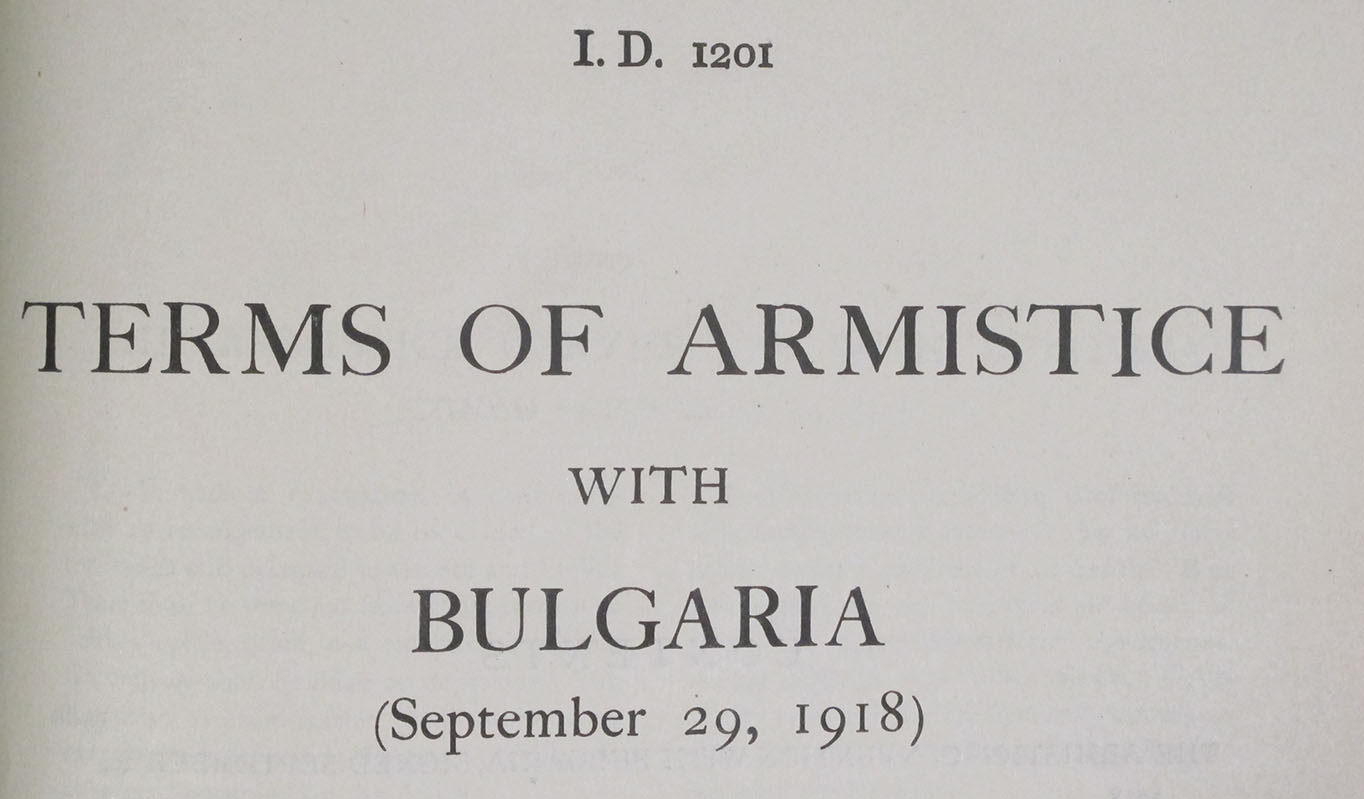
Terms of armistice with Bulgaria. Catalogue reference ADM 116/1931
Background
Bulgaria had joined the war on the side of Germany and the Central Powers in September 1915, following repeated initiatives on behalf of both the Allied and the Central Powers to court their allegiance.
The country’s strategic position and large standing army made it a powerful ally for whichever side managed to secure its participation. Bulgaria is bordered by Romania to the north, the Black Sea to the east, Turkey to the south-east, the Aegean Sea and Greece to the south and Serbia to the west.
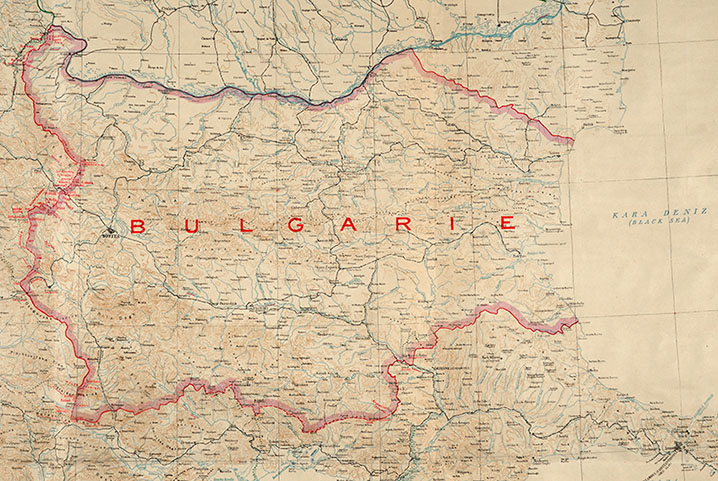
Map of Bulgaria. Catalogue reference FO 925/21109.
Bulgaria was keen to regain territory lost in 1913 during the Second Balkan War: under the Treaty of Bucharest, the country was forced to cede territory gained from the Ottoman Empire to Serbia, Greece and Romania (FO 881/10299X). In particular, there was popular support for Bulgaria to regain lost territory in Serbian Macedonia, which had a large population of ethnic Bulgarians.
The Bulgarian Army invaded Serbia on 14 October 1915. Skopje, the capital of Serbian Macedonia, was taken on 22 October; within six weeks the country was overrun (FO 371/2273). The remains of the Serbian Army were forced to escape through Albania to avoid capture (FO 373/1/2).
In June 1917, Greece entered the war on the Allied side and joined the multi-national army in the region, called the Allied Army of the Orient. This comprised French British, Russian, Serbian, Italian and Greek forces, along with a small number of Portuguese, Albanian and Montenegrin troops (WO 106/1374).
On 15 September 1918, this large force – commanded by French General Louis Franchet d’Espèrey – broke through the Macedonian front and rapidly advanced to Sofia, the Bulgarian capital. This forced Bulgaria to seek an armistice (CAB 23/14/33, FO 371/3148 file 6102).
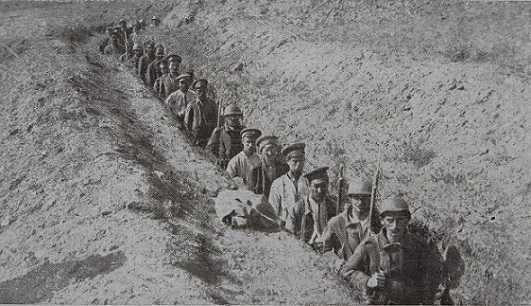
Bulgarian front: Greek soldiers escorting Bulgar prisoners along a trench. Illustrated London News July – December 1918. Catalogue reference ZPER 34/153
Armistice
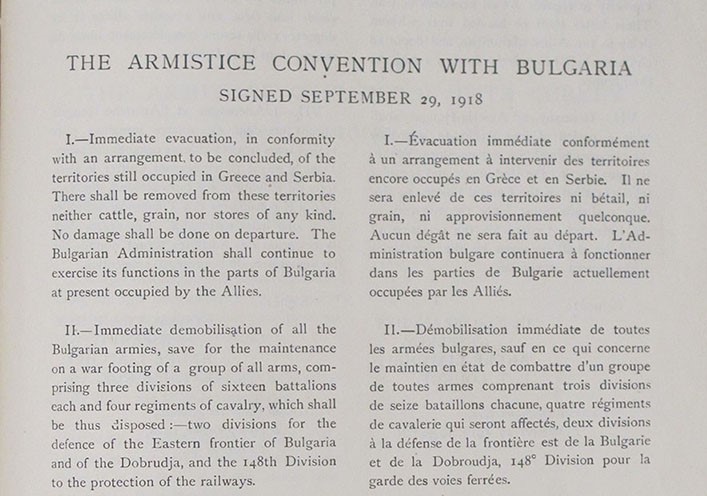
Terms of armistice with Bulgaria. Catalogue reference ADM 116/1931
The armistice was signed at the General Headquarters of the Allied Army of the Orient at Salonica at 22:50 on 29 September, and was to come into force at 12:00 noon on 30 September. It was signed by General Franchet d’Espèrey, Bulgarian General Ivan Loukov and Bulgarian cabinet minister Andrey Lyapchev.
The terms of armistice were as follows:
- Immediate evacuation in conformity with an arrangement to be concluded, of the territories still occupied in Greece and Serbia. There shall be removed from these territories neither cattle, grain, nor stores of any kind. No damage shall be done on departure. The Bulgarian administration shall continue to exercise its functions in the parts of Bulgaria at present occupied by the Allies.
- Immediate demobilization of all of the Bulgarian armies, save for the maintenance on a war footing of a group on all arms, comprising three divisions of sixteen battalions each and four regiments of cavalry, which shall be thus disposed:- two divisions for the defence of the eastern frontier of Bulgaria and of the Dobrudja, and the 148th Division to the protection of the railways.
- Deposit at points to be indicated by the High Command of the Armies of the East of arms, ammunition and military vehicles belonging to the demobilised units which shall thereafter be stored by the Bulgarian authorities under the control of the Allies. The horses, likewise, will be handed over to the Allies.
- Restoration to Greece of the material of the IVth Greek Army Corps, which was taken from the Greek Army at the time of occupation of Eastern Macedonia, so far as it has not been sent to Germany.
- The units of the Bulgarian troops at the present time west of the meridian of Uskab and belonging to the XIth German Army, shall lay down their arms and shall be considered until further notice to be prisoners of war. The officers shall retain their arms.
- Employment by the Allied armies of Bulgarian prisoners of war in the East until the conclusion of peace, without reciprocity as regards Allied prisoners of war. These shall be handed over without delay to the Allied authorities and deported civilians shall be entirely free to return to their homes.
- Germany and Austria shall have a period of four weeks to withdraw their troops and military organisations. Within the same period the diplomatic and consular representatives of the Central Powers, as also their nationals, must leave the territory of the Kingdom. Orders for the cessation of hostilities shall be given by the signatories of the present convention.
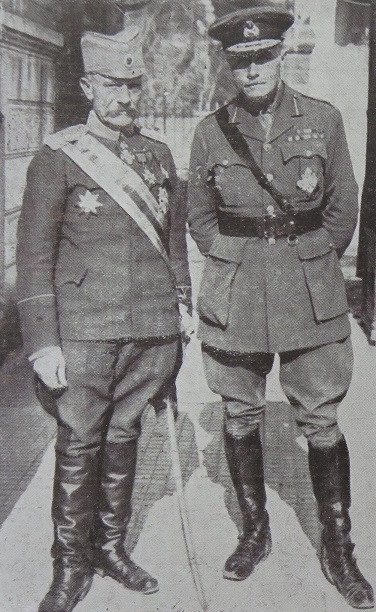
Bulgarian Front: General Mishitch, Commander of Serbian forces and General Milne Commander of British forces in the Balkans. Illustrated London News, July – December 1918. Catalogue reference ZPER 34/153
The speed of the advance of the Allied Army of the Orient had taken the British War Cabinet by surprise. The officer commanding the British forces on the Macedonian front was General Milne, who acted under the orders of General Francher d’Esperey, but there were no British officers on the French general’s staff.The Prime Minister, David Lloyd George, expressed concern that he had not received full situation reports and had to learn about developments from the French Prime Minister, Georges Clemenceau. The war cabinet resolved that
a senior officer should be posted at General Franchet d’Espèrey’s headquarters, in a position similar to that occupied by General Du Cane at Marshal Foch’s Headquarters. (CAB 23/14/35)
Later, in a rather fractious Three Power discussion on 30 October 1918, Lloyd George complained to his French and Italian counterparts – Georges Clemenceau and Vittorio Orlando – that
General Franchet d’Espèrey had treated General Milne extremely badly. The first flag of truce had been sent to General Milne, who had just as big an Army as the French, and had occupied the positions for two or three years. General Milne had sent the messenger on to General Franchet d’Espèrey, who had dealt with the [armistice] questions without even the civility of asking General Milne to take part in the negotiations, and without consulting him at all. No British Admiral would ever have done a thing such as that. (ADM 116/1652)
Despite the tension between the Allies, the Bulgarian surrender meant that the forces in the area could concentrate their efforts towards shortening the war by reaching Constantinople in Turkey and Belgrade in Serbia. The armistice terms remained in force until the signing of the peace treaty between Bulgaria and the Allies – the Treaty of Neuilly-sur-Seine – on 27 November 1919 (FO 93/21/7).
We plan to publish more blog posts in the series Milestones to Peace over the next few months, to coincide with the armistices signed by Turkey, Austria-Hungary and Germany, the Paris Peace Conference, and the subsequent peace treaties with all of the Central Powers.
There will also be a post on the Peace Day celebrations which took place across the UK on 19 July 1919.
All of the armistices and treaties will be shown together for the first time during the conference ‘Peace making after the First World War’ taking place from Thursday 27 to Friday 28 June 2019.
For more details of our First World War commemoration programme, take a look at our First World War 100 pages.
It was peace at a cost, I believe Bulgaria had to pay £100 million reparations, the issue (reparations) John Maynard Keynes knew was a major problem and lead to the Second World War. Despite the Versailles Peace Treaty the UK was still officially at war with Germany until 9 January 1920. I find it strange that there are references to Admiralty records rather than the Foreign Office records.